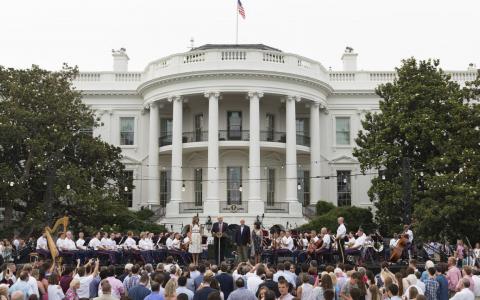
With last year’s White House tell-all looking like an instant best seller, confidentiality looks precarious. Why not just reveal yourself now?
Anonymous and pseudonymous exposés are an age-old tactic in politics, so it really wasn’t a shock to see a “senior official in the Trump administration” take to the New York Times with unsourced reminiscences.
People in that world leak all the time to achieve their goals. What’s shocking here is trusting the veil of confidentiality to hold up now that the newspaper essay has expanded into a substantial book deal.
You can’t stay “anonymous” forever, especially if the Justice Department is hunting you in a world where every major financial transaction leaves a public paper trail behind.
“Cowardice” and culpability
The White House is a small world so the number of people who could have written a credible book-length look at its inner workings is always going to be limited.
Everyone with normal access to the presidential decision-making process will get caught in the monitors and record-keeping protocols. Calls are logged. Calendars are open.
If “A Warning” is credible, there’s a traceable relationship from the information it contains to the people who were at the meetings it portrays. Sooner or later, the data points line up.
And if they don’t, it’s hard to argue that the book was written by a single person with first-hand experience. There’s either a compelling perspective here or there’s no reason to take any of it seriously.
The White House, understandably, wants to know. Trump and others call the author a coward for refusing to take personal responsibility.
After all, anybody can say anything. Putting a name and a career on the line give the comments moral weight.
The argument for continued confidentiality revolves around protecting the author from reprisals and theoretically allowing him or her to retain access to the presidential circle.
It’s a hard argument to sustain. Nobody gets security clearance under an alias. You fill out the forms with your real name and your Social Security Number is attached.
Whoever wrote this book has a file just like everyone else who works in the White House. Usually what happens in the White House stays there.
If the author claims a higher moral authority requiring the world to know these things, it’s still a breach that needs to be closed. There’s no hedging. Your career will either recover or it won’t.
And any crimes you commit in the process may or may not have extenuating circumstances to mitigate the penalties.
Either way, the Justice Department is leaning on the publisher and literary agents who made this book deal happen. Non-disclosure agreements at the very least appear to have been breached.
While it’s always a question whether an NDA is enforceable in government situations, the publishing world is not known for its ironclad discipline.
Rumors are a fact of life. So is professional jealousy. If this book does as well as the buzz indicates, all the editors are going to be chasing their own “anonymous” to match the success.
There’s a lot of scrutiny here. With that many eyes on this space, someone is going to put the clues together.
Following the money
Money leaves marks. That was true in the Watergate era of hidden informants and it’s even more true now.
A newspaper op-ed doesn’t pay enough to move the needle. A best-selling book will get millions of dollars in motion.
If the author is still in the government, that cash flow is going to show up in the annual financial disclosures. When it looks like a book deal and there’s no book, that’s probably your “anonymous” figure.
Admittedly, the publisher was smart. Because there’s no advance, the 2020 disclosures will dodge a sudden unexplained windfall. Royalties can be finessed around the deadline as well.
Sooner or later the money will show up. And if the author ducks disclosure by quitting, that narrows the pool of suspects as well.
A year from now, we’ll probably know the truth. The clock is ticking.
Meanwhile, the White House is a target-rich environment for book deals. Odds are extremely good that we can scratch people like Nikki Haley and John Bolton off the list.
They have high-profile deals under their own names. Adding a clandestine title to their portfolio is unlikely unless we’re looking at literally insane levels of subterfuge here.
Know your author, know your customer
Pseudonymous authorship survives when the person cashing the checks is beneath notice. The name on the cover may be a fiction but that’s where all the public attention goes.
Thomas Pynchon could have been anyone. He didn’t have a security clearance or a high-profile job. There was no paper trail outside the publisher’s accounting system to tie him to the books themselves.
Publishing accounts are subject to discovery. So are the communications with the agents who set the deal up.
With the Justice Department talking about legal action, those records are going to reach the authorities or at least their lawyers. There’s no journalistic right to protect your “sources” here.
Granted, people have been extremely careful, using secure phones and face-to-face meetings to shorten the trail as much as possible.
But we live in a very data-rich world. Even holes in the record show up sooner or later. Match the phone records to the holes. See who shows up.
If the goal here is to create a permanent historical enigma, that’s not going to happen. Any confidentiality here is temporary once cash is on the table.
It’s a lot like life. The transaction takes it from the realm of talk into the real world.
That happened the minute the contracts were signed in someone’s name.



